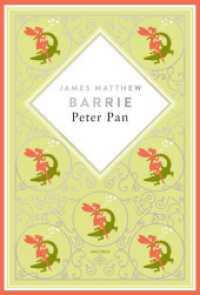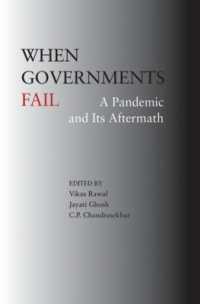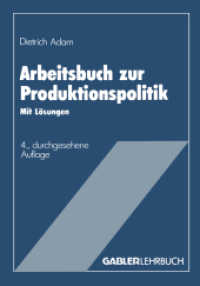Full Description
For readers in the English-speaking world, almost all Holocaust writing is translated writing. Translation is indispensable for our understanding of the Holocaust because there is a need to tell others what happened in a way that makes events and experiences accessible - if not, perhaps, comprehensible - to other communities.
Yet what this means is only beginning to be explored by Translation Studies scholars. This book aims to bring together the insights of Translation Studies and Holocaust Studies in order to show what a critical understanding of translation in practice and context can contribute to our knowledge of the legacy of the Holocaust.
The role translation plays is not just as a facilitator of a semi-transparent transfer of information. Holocaust writing involves questions about language, truth and ethics, and a theoretically informed understanding of translation adds to these questions by drawing attention to processes of mediation and reception in cultural and historical context. It is important to examine how writing by Holocaust victims, which is closely tied to a specific language and reflects on the relationship between language, experience and thought, can (or cannot) be translated.
This volume brings the disciplines of Holocaust and Translation Studies into an encounter with each other in order to explore the effects of translation on Holocaust writing. The individual pieces by Holocaust scholars explore general, theoretical questions and individual case studies, and are accompanied by commentaries by translation scholars.
Contents
Figures
Tables
List of Contributors
Acknowledgements
1. Introduction, Jean Boase-Beier, Peter Davies, Andrea Hammel and Marion Winters
2. Ethics and the translation of Holocaust lives, Peter Davies
Response, Susan Bassnett
3. Witnessing complicity in English and French: Tatiana de Rosnay's Sarah's Key and Elle s'appelait Sarah, Sue Vice
Response, Michaela Wolf
4. A Textual and Paratextual Analysis of an Emigrant Autobiography and Its Translation, Marion Winters
Response, Kirsten Malmkjær
5. In the Shadow of the Diary: Anne Frank's fame and the Effects of Translation, Marian De Vooght
Response, Theo Hermans
6. Translating Cultures and Languages: Exile Writers between German and English, Andrea Hammel
Response, Chantal Wright
7. Holocaust Poetry and Translation, Jean Boase-Beier
Response, Francis Jones
8. Voices from a Void: The Holocaust in Norwegian Children's Literature, Kjersti Lersbryggen Mørk
Response, B. J. Epstein
9. Distant stories, Belated memories - Irène Némirovsky and Elisabeth Gille, Angela Kershaw
Response, Gabriela Saldanha
10. Self-translation and Holocaust Writing: Leonora Carrington's Down Below, Jeannette Baxter
Response, Cecilia Rossi
Index







